Completed evaluations
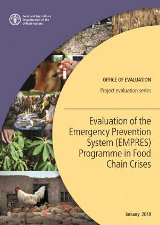
Evaluation of the Emergency Prevention System (EMPRES) Programme in Food Chain Crises
03/05/2018
In today’s inter-connected world, trans-boundary animal/ plant diseases and pests are becoming a greater concern. Countries are increasingly investing in policies and regulations to manage old and new trans-boundary diseases that threaten health, markets and the safe production of food. FAO is uniquely positioned to assist countries to scale up their capacities and manage these threats.
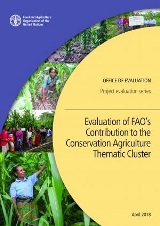
Evaluation of FAO’s Contribution to the Conservation Agriculture Thematic Cluster
01/05/2018
Based on three principles – minimum soil disturbance, permanent soil cover and crop rotation - Conservation Agriculture (CA) is an approach that intends to increase productivity while conserving the environment.
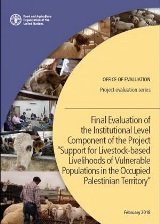
Final Evaluation of the Institutional Level Component of the Project “Support for Livestock-based Livelihoods of Vulnerable Populations in the Occupied Palestinian Territory"
27/04/2018
Palestinians in the WBGS face a protracted crisis; durable and sustainable solutions are needed to protect and promote their livelihoods beyond short-term responses. In an effort to link relief, rehabilitation and development, this project represents the institutional component of a larger programme funded by the European Union to provide “Support...
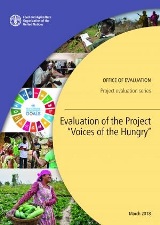
Evaluation of the Project “Voices of the Hungry”
30/03/2018
Assessing the levels of hunger and food insecurity is essential for alerting decision makers, ensuring accountability, and developing and monitoring policies aimed at addressing hunger. The “Voices of the Hungry” Project is an effort to develop a global Food and Nutrition Security indicator based on people’s own perceptions of hunger.
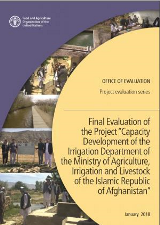
Final Evaluation of the Project “Capacity Development of the Irrigation Department of the Ministry of Agriculture, Irrigation and Livestock of the Islamic Republic of Afghanistan”
06/03/2018
This report presents the findings, conclusions and recommendations of the final evaluation of the project implemented by FAO and funded by the Japanese Cooperation Agency (JICA). The project was designed to improve the capacity of the Irrigation Department to formulate, implement, monitor and evaluate agriculture irrigation development projects.
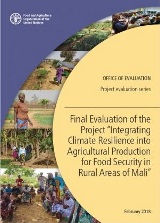
Final Evaluation of the Project “Integrating Climate Resilience into Agricultural Production for Food Security in Rural Areas of Mali”
28/02/2018
The overall objective of the project was to “enhance the capacity of Mali’s agricultural sector to successfully cope with climate change, by incorporating climate change adaptation (CCA) concerns and strategies into ongoing agricultural development initiatives and mainstreaming CCA issues into agricultural policies and programming”.
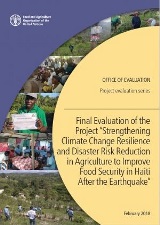
Final Evaluation of the Project “Strengthening Climate Change Resilience and Disaster Risk Reduction in Agriculture to improve Food Security in Haiti after the Earthquake”
28/02/2018
Over the past decade, the country of Haiti located in the Caribbean has been subjected to numerous natural disasters, including Hurricanes Isaac and Sandy in 2010. Implemented by FAO and funded by the LDF, this project sought to restore livelihoods, introduce climate-smart agriculture techniques and rehabilitate damaged land.
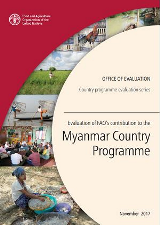
Evaluation of FAO’s contribution to the Myanmar Country Programme
20/02/2018
The purpose of the evaluation was to help orient FAO’s programme in Myanmar and to make it more relevant to the country’s needs and priorities. Moreover, the evaluation sought to identify lessons learned and make recommendations that will be useful for FAO’s future engagement in the country and the design of the next FAO Myanmar Country Programming Framework (CPF).
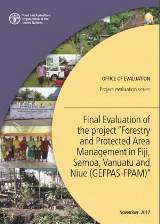
Final Evaluation of the project “Forestry and Protected Area Management in Fiji, Samoa, Vanuatu and Niue (GEFPAS-FPAM)”
15/02/2018
This report presents the findings of the Final Evaluation of the six year GEF-FAO project implemented between 2012 and 2017. The project’s global environmental objective was to strengthen biodiversity conservation and reduce forest and land degradation’ and the development objective was ‘to enhance the sustainable livelihoods of local communities living in and around protected areas.
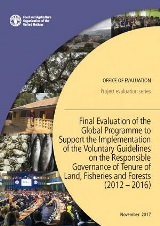
Final evaluation of the Global Programme to Support the implementation of the Voluntary Guidelines on the Responsible Governance of Tenure of Land, Fisheries and Forests (2012 – 2016)
04/01/2018
The Voluntary Guidelines on the Responsible Governance of Tenure of Land, Fisheries and Forests (VGGTs) provide principles and best practices for governance of tenure. Since their adoption in 2012, FAO has implemented various projects to support the VGGTs being applied to improve governance of tenure.
